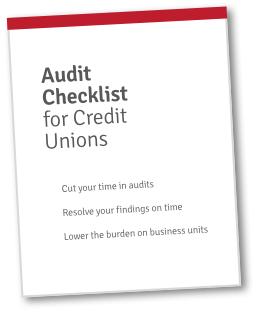“The only constant in life is change,” said the Greek philosopher Heraclitus. That feels particularly true lately.
Recently, two NCUA Board Members were removed from office before the end of their terms. This has resulted in some discussion about how much the NCUA is able to accomplish or enforce.
Furthermore, there are some lingering questions about other regulatory bodies (such as the CFPB), as well as rumblings of rising pressure on the credit union tax exemption. We may be in for a long period of regulatory uncertainty.
So, what does all this mean for credit union auditors?
See the discussion that sparked this here (around the 14-minute mark):
Regulations Exist for a Reason
NCUA board firings, existential threats to the CFPB, and changes to general economic conditions can be worrisome. After all, the purpose of regulatory agencies is to protect institutions and consumers.
For now, it’s unclear how all this will play out. For now, the NCUA has stated that its operations and supervision activities will continue as normal. Yet, the stability and direction of regulatory bodies may not be as certain as before.
More changes may come in the form of examination focus, regulatory priorities, or enforcement. Any changes may affect protections to institutions and consumers.
When faced with uncertainty, especially as auditors, the best move is to stay vigilant and hold to the same standards as before.
The Need for Internal Consistency
When external circumstances are uncertain, internal consistency matters more.
Credit unions that have strong processes for compliance, audit management, and risk oversight will be in a better position to adjust if needed.
Even if the NCUA becomes less active or shifts its focus, credit unions still owe it to their members to maintain strong internal controls and risk management practices.
It is important to remember that regulators are not the reason credit unions must manage risk. Good governance and financial responsibility are part of the mission to serve members safely. External regulators simply help enforce those responsibilities. Whether regulators are highly active or less involved, credit unions must continue to hold themselves to a high standard.
Carrying the Responsibility
If regulatory scrutiny lessens, it does not mean the risks go away. It simply means that credit unions have even more responsibility to manage those risks on their own. Sound practices do not become less important because fewer people are checking.
Credit unions should continue regular internal audits and ensure findings are tracked and addressed. They should review risk assessments, member services, and technology processes to stay aligned with industry best practices. They should use the opportunity to improve—not to relax.
This moment offers a chance to show that the credit union movement is built on trust, stewardship, and member-first principles. Strong internal consistency will protect not just individual credit unions, but the industry as a whole.
What to Do Next
If the NCUA were to suddenly disappear tomorrow, what would you do?
The best answer would be, “Complete my audit plan as usual.”
You might even consider doing more—going above and beyond—to reduce risk and meet your credit union’s compliance needs.
Want to see how Redboard can help you save time on audits? Learn more here: https://www.redboard.com/request-demo
Or see how the $10B DCU and the $100M Point West Credit Union use Redboard.


 Get FREE Access to the Audit Checklist for Credit Unions!
Get FREE Access to the Audit Checklist for Credit Unions!


